Is It Safe to Drive in South Africa? Road Safety Tips
Driving in South Africa is reasonably safe, but has its challenges. From wildlife and roadside crime to poor rural roads, here's everything you need to know.
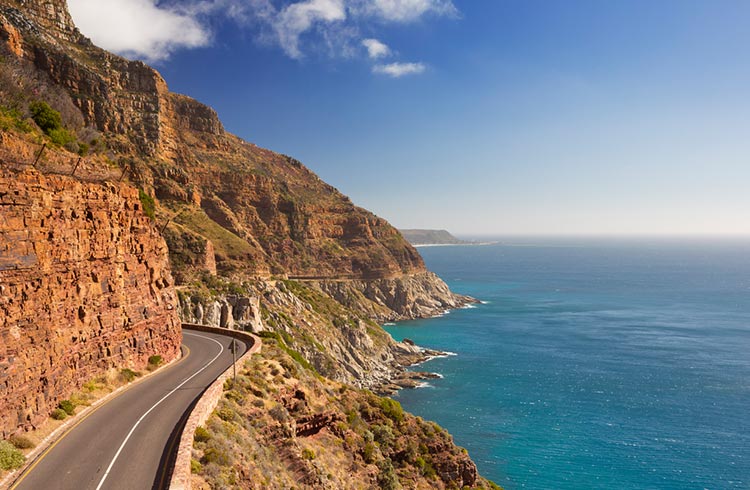 Photo © iStock/Sara Winter
Photo © iStock/Sara Winter
Roads in South Africa are well maintained and easy to navigate, and for the most part travelers who hire a car to explore the country say it's a piece of cake.
Roads in rural areas present more of a challenge to drivers and can be dangerous. And given the high crime rate in South Africa, drivers are often faced with much more than just traffic hazards.
Keep these safety tips in mind while you drive South Africa's scenic roads and highways.
- Hazards on South Africa's roads
- Wildlife on South Africa's roads
- Roadside crime risks in South Africa
Hazards on South Africa's roads
Drivers in South Africa love to overtake other cars on the road. Expect it to happen on any street, and from any lane (including the shoulder lane), so stay alert, check your rear-view mirrors, and watch out for blind spots. If you see someone trying to overtake you, just pull over (if it's safe to do so) and let them pass.
Use your judgment. Don't pull over if you're near a sharp bend, close to the edge of a cliff, or on a tight street. Just slow down, maybe put your hazards on, and wait for a safe place to stop. Never speed up for the satisfaction of the driver behind you.
Always be alert when you come to an intersection with a four-way stop, which are common in South Africa. The first car to arrive has the right of way, so pay attention and wait your turn to avoid a possible collision.
Minibuses are a popular way to get around in South Africa, however, they can be dangerous. Reports show that hundreds of accidents involving minibusses occur each year, and many include fatalities. Metered taxis or Uber are generally safer options. Be sure to use an accredited taxi service, and be aware of ongoing tensions between Uber drivers and taxi drivers, which sometimes escalate into violence.
In rural areas, street signs and road markings are often lacking, and in many cases nonexistent. It's not uncommon to find roads that aren't marked on your map, or for street numbers and addresses to be totally different from what you expected. It's particularly important to understand where you're going before you set out, that way you can avoid getting lost or ending up in a dodgy area.
Watch for pedestrians while driving. School children often have long walks to and from school, and sometimes carelessly wander onto the road.
Many farmers don't bother fencing their livestock in, so don't be surprised if you come around a bend and see a cow or goat in the middle of the street. During daylight hours this may not be an issue, but at night, especially on roads that aren't well lit, it can be extremely hazardous – so drive carefully.
Wildlife on South Africa's roads
One of the many reasons travelers head to South Africa is for the diversity of wildlife, including the "Big Five": lions, leopards, rhino, buffalo, and elephants.
If you're planning to take a drive through the many game parks and reserves, here are some important safety tips to keep at top of mind:
- It is called wildlife for a reason. These animals are in no way tame, and it's important to give them the space they need. Any animal which feels threatened can become dangerous, especially if they have young ones in tow.
- Avoid driving at dawn or dusk – this is when most animals are out feeding. If you want to see animals at these times safely, go with a guided tour.
- Never leave your vehicle unless you have stopped at a designated area or a rest stop.
- If wildlife does cross your path, stop the car, turn off your engine and sit quietly, making as little noise as possible – no radio, music, or talking – nothing. Keep your windows up and wait for the animals to pass. If they linger too long and you get worried, call the emergency number in South Africa (10111). If you have no reception or are unable to call, wait it out and try not to panic.
- Do not feed any animals from your vehicle (or ever, for that matter). Not only does it disrupt their natural diet, it can place you in danger. Baboons, in particular, are attracted by food and can become aggressive.
- Always follow any reserve or game park signage or rules displayed.
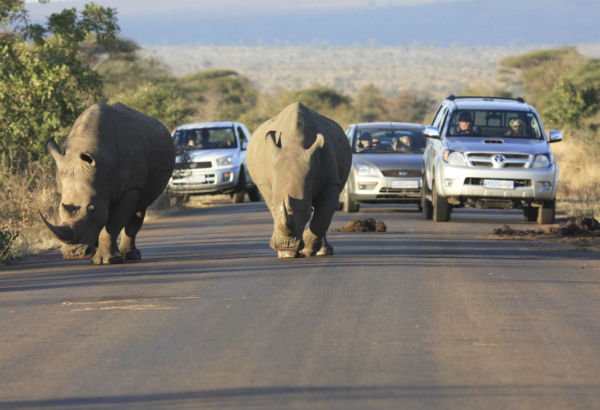
Roadside crime risks in South Africa
South Africa is a beautiful country, but there is also a lot of criminal activity going on. Though you may feel safe inside a vehicle, there are still some dangers to be aware of. Here are some things to keep in mind, plus a few safety tips to avoid becoming a victim while behind the wheel.
- The most important rule is to keep your doors locked and windows rolled up at all times, even if you're in an area that you feel is safe.
- It's not uncommon for thieves to wait near intersections and on highway off-ramps, approach a car when it stops and attempt to rob the driver and passengers. Keep your valuables out of sight to avoid attracting the attention from would-be thieves.
- Carjacking (or car hijacking, as it's called locally) is an issue in South Africa, particularly in the Northern Cape, Western Cape, North West, KwaZulu-Natal and Gauteng.
- The roads leading into and out of Kruger Park are also common places for carjackers to strike.
- Be cautious of any debris you see on the road. It may have been placed there purposely by a criminal in an attempt to get vehicles to stop. Never get out of your vehicle to clear anything from the road, just do your best to drive around it.
- Never stop to pick up hitchhikers. No matter how lost or pitiful they seem, chances are their intentions are not good. It's not worth the risk. If you see someone thumbing for a ride and feel they are in trouble or need assistance, your best bet is to stop when you get to the next town and report the situation to the police.
- When parking your vehicle, always keep it locked with the windows rolled up and all valuables completely out of sight.
- Whenever possible, use a parking garage or store parking lot. You will likely have to pay a fee; however, these places are usually safeguarded and feature security staff to help maintain your vehicle's safety. If there are no facilities like this around, select a busy and well-lit area to park.
- If your vehicle breaks down or you get a flat tire, pull over as far as possible from the road and put on your hazard lights. Remain in your vehicle at all times, with the doors locked and windows up. Most rental car companies offer road-side assistance, so call them if you can.
- If you‘ve been in a collision or are hurt, call the police, but do not get out of your vehicle. Read more about why you shouldn't get out of the car here
- If you see another motorist who has broken down on the side of the road, no matter how much you want to help, do not stop to offer assistance. Either have a passenger call the police or stop in the next town to alert the police or someone with a phone.
- Another scam involves fraudulent traffic police. If in doubt, always offer to follow them to the police station if they demand a fine.
- The larger cities and towns have their share of crimes involving drivers. While stopped at a traffic light, remain alert at all times. Keep an eye on your mirrors for anyone approaching. People may attempt to sell you something; never roll your window down to buy merchandise.
- If someone approaches your car and starts washing your window at a set of lights, wave them away – stop them immediately or they will demand money and the situation can get pretty serious. There have been reports of verbal abuse and even damage to vehicles. This practice is actually illegal and if you allow it to happen, you could be considered just as guilty as the person committing the offense.
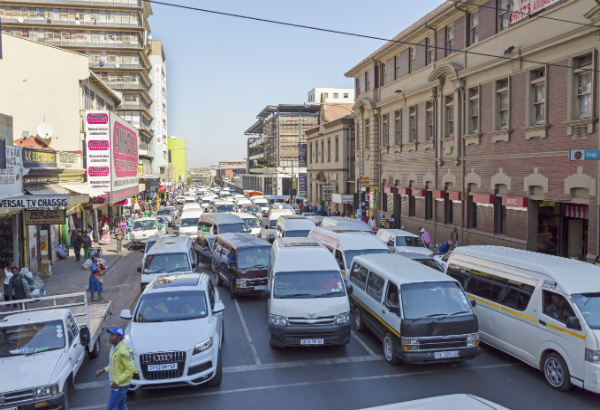
Related articles
Simple and flexible travel insurance
You can buy at home or while traveling, and claim online from anywhere in the world. With 150+ adventure activities covered and 24/7 emergency assistance.
Get a quote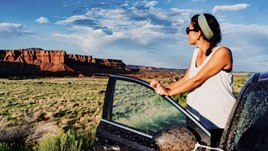
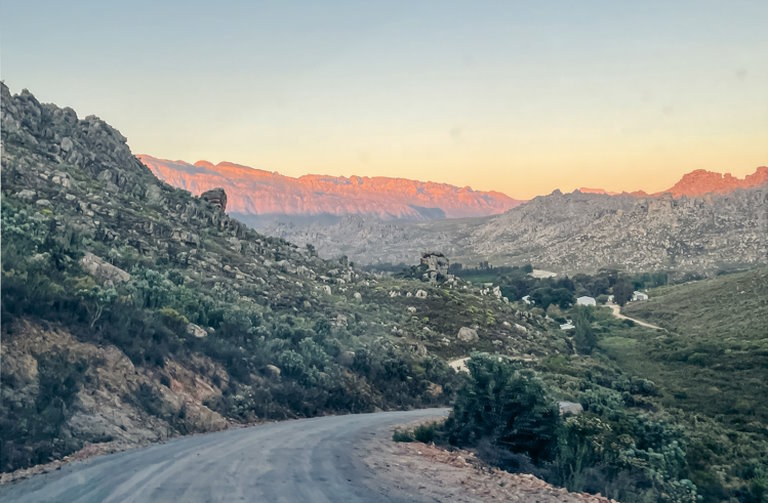
1 Comment